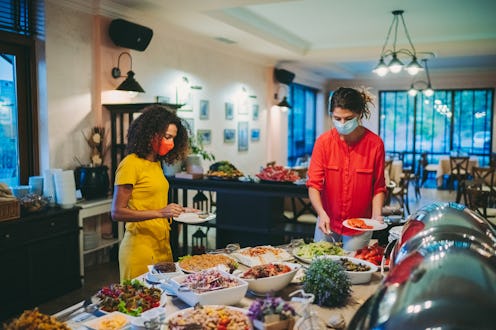Health
Feeling & Being COVID-Safe Are Totally Different Concepts
The holidays make the distinction even trickier.

In pandemic times, people have had to learn and re-learn what being COVID-safe actually means, to varying effects. Seeing TV shows where characters aren’t wearing masks can feel super unsafe, even if you know Friends was filmed 20 years before you learned what social distancing was. In contrast, being with family is supposed to feel safe, but with coronavirus surging across the country, traveling home for Thanksgiving is really, really risky. Experts say that feeling and being COVID-safe are two different things, and navigating the cognitive dissonance between the two is an important part of pandemic protection.
Dr. Robert Kim-Farley, a professor in the UCLA Fielding School of Public Health and an associate editor for the American Journal of Public Health, tells Bustle that the pandemic constantly challenges the way we perceive safety. "Oftentimes, people think of safety for communicable diseases as being primarily related to such measures as hand-washing," he says. (To be clear, the CDC recommends frequent hand-washing to prevent the spread of COVID-19, on top of wearing masks and keeping distance.) “There are also concerns about transmission through droplets due to coughs and talking and even breathing — as well as even smaller particles that may linger in the air and travel further distances than six feet," he says. Being COVID-safe means having to conceptualize this broader, less tangible kind of transmission than what you’re used to — and figure out how to manage your own, individual risk.
Squaring COVID safety measures with how you traditionally think about feeling safe can feel really bizarre. "There is so much pressure to put family first during the holidays, and it’s weird that putting family first right now means not seeing them," family therapist Dawn Friedman, M.S.E.d., tells Bustle. “It doesn’t help when their parents say, 'Oh you can come to visit, it’s just us! We’re family!' Because the virus doesn’t pay attention to family trees," she adds. People are being faced with choices that go against non-pandemic common sense: family is dangerous, isolation is healthy.
You're not ruining the holiday, the virus is.
Feelings are even more complicated when different members of your family have different ideas about what being safe looks like. Some people can't justify cancelling their holiday plans because they feel impervious to a virus that they can't see. Your mom’s side of the family might be willing to risk getting sick in order to all have lunch together, while your cousins don’t even want to log onto Zoom since it “won’t feel the same.” If you find yourself caught in the middle, it's important to remind your family that "You're not ruining the holiday, the virus is," Friedman says. Ultimately, people need to find ways to reconcile what they feel should be safe — being with family — with what is actually COVID-19-safe; namely, wearing masks, keeping physical distance, washing hands, and staying home, says Kim-Farley.
Friedman emphasizes that individual actions — both to prevent COVID and manage hard emotions — will make a difference this year. "I’ve been telling clients to figure out what is the minimum required to make this a decent holiday. Lower your standards, and ask your family to lower theirs, too," she says. "We can spend next holiday season laughing about how lousy this one was, but we can do it together as long as we’re safe, now."
Experts:
Dr. Robert Kim-Farley, a professor in the UCLA Fielding School of Public Health and associate editor for the American Journal of Public Health
Dawn Friedman, M.S.E.d., family therapist